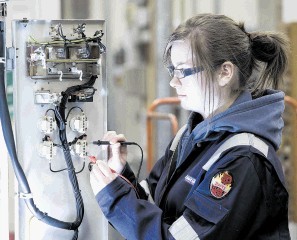
The Scottish and UK economies have gone through a very difficult period since the financial crisis first hit in 2008. We have had nearly five years of little or no economic growth.
One of the few bright spots has been the North Sea oil and gas industry, which is currently experiencing a new boom, as Energy readers of course know.
Although production has been declining at alarming rates, there is currently a high level of development activity which should continue until at least 2017.
The Scottish north-east, and Aberdeen in particular, is clearly benefiting from this good fortune. As a result, most of the local economic indicators are much better than those for the rest of Scotland and the UK.
Earnings in the offshore industry are very high. Unemployment in many parts of the country is also very high. Therefore there should be no problems in recruiting people to work in the sector, though there obviously are, which surprises me.
Subsea UK recently stated that there was a shortage of about 10,000 skilled people in the North Sea alone.
I would have thought that in the present economic climate many people would want to work in the industry but that does not seem to be the case.
I read recently that there had been 700 applications for one job in a coffee shop in London. Why does that not seem to be happening in the oil and gas industry?
The recruitment firm Hays produces an excellent annual Oil and Gas Global Salary Guide, which Energy reviews. The 2013 edition gives an annual average for people working in the industry in the UK of $93,400 last year, which is equivalent to about £81,200.
The UK Government also publishes an Annual Survey of Hours and Earnings (ASHE), which includes statistics for every local authority area in the country. The 2011 average for Aberdeen City was about £24,000 per person and for Aberdeenshire £22,600.
In other words, annual salaries/wages in the oil and gas industry are more than three times the local averages. Indeed, the multiple must be even higher because the local averages include people working in the industry.
Why, therefore, are more people not choosing to work in oil and gas? It could be argued that relatively high house prices in the north-east are a deterrent and there must be some truth in that. However, many of the jobs are offshore.
Anyone who visits Aberdeen airport or railway station will know that many offshore workers do not live locally. Their local unemployment levels are much higher than in the north-east so I would have expected much more interest from other parts of the UK.
The Hays survey gives the worldwide average as $87,300, which was +8.5% higher than the previous year. The US average was $124,100 and Norway $152,600, compared with $93,400 in the UK industry. In that context, therefore, UK salaries seem relatively low.
Indeed, the Hays report states that “a brain drain of professionals overseas continues to take its toll on the UK talent pool in general. The relatively low salary levels in the UK clearly contribute to this effect and it will take further significant rises domestically before we see the trend reversing.”
The salary levels may be relatively low in comparison with Norway and the US but they are very high in comparison with other industries in the UK – with the exception of the chosen few in our banks, of course.
It could also be argued that there is a short-term problem related to training but the UK recession dates back five years to 2008, which is surely long enough to boost training programmes. Opito and other bodies are very active but there does seem to be a need for greater efforts to attract people, particularly the young, into the North Sea industry.
It has suffered in the past from the cycles in activity levels, which in turn were largely a consequence of big fluctuations in oil prices. Some people have been understandably deterred because of the lack of long-term career prospects.
In the present economic climate, however, there must be a huge potential labour pool in the UK. Opito and the others have a vital role to play in terms of translating that into a skilled labour force for the industry.
Tony Mackay is the MD of energy economists Mackay Consultants
